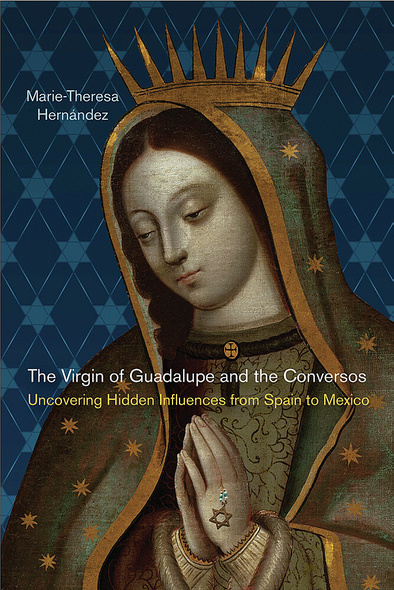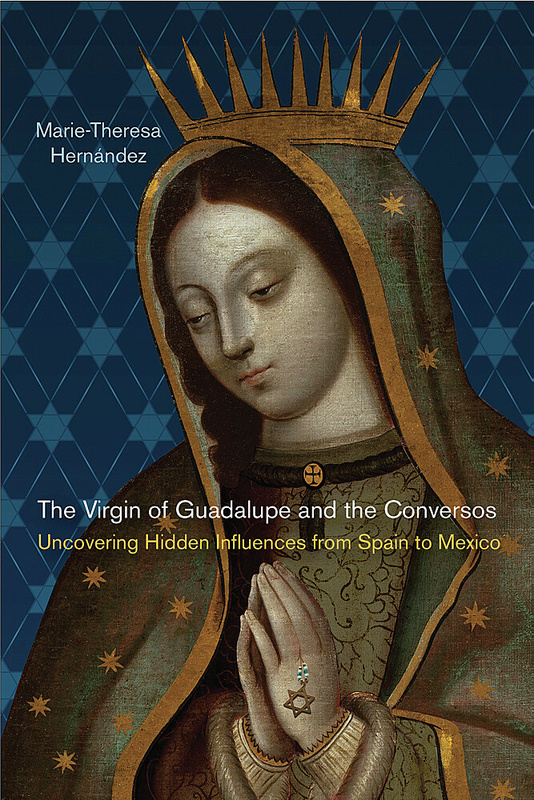
pages, 6 x 9
14 photographs
Paperback
Release Date:15 Jul 2014
ISBN:9780813565682
Hardcover
Release Date:15 Jul 2014
ISBN:9780813565699
The Virgin of Guadalupe and the Conversos
Uncovering Hidden Influences from Spain to Mexico
Rutgers University Press
Hidden lives, hidden history, and hidden manuscripts. In The Virgin of Guadalupe and the Conversos, Marie-Theresa Hernández unmasks the secret lives of conversos and judaizantes and their likely influence onthe Catholic Churchin the New World.
The terms converso and judaizante are often used for descendants of Spanish Jews (the Sephardi, or Sefarditas as they are sometimes called), who converted under duress to Christianity in the fourteenth and fifteenth centuries. There are few, if any, archival documents that prove the existence of judaizantes after the Spanish expulsion of the Jews in 1492 and the Portuguese expulsion in 1497, as it is unlikely that a secret Jew in sixteenth-century Spain would have documented his allegiance to the Law of Moses, thereby providing evidence for the Inquisition.
On a Da Vinci Code – style quest, Hernández persisted in hunting for a trove of forgotten manuscripts at the New York Public Library. These documents, once unearthed, describe the Jewish/Christian religious beliefs of an early nineteenth-century Catholic priest in Mexico City, focusing on the relationship between the Virgin of Guadalupe and Judaism. With this discovery in hand, the author traces the cult of Guadalupe backwards to its fourteenth-century Spanish origins. The trail from that point forward can then be followed to its interface with early modern conversos and their descendants at the highest levels of the Church and the monarchy in Spain and Colonial Mexico. She describes key players who were somehow immune to the dangers of the Inquisition and who were allowed the freedom to display, albeit in a camouflaged manner, vestiges of their family's Jewish identity.
By exploring the narratives produced by these individuals, Hernández reveals the existence of those conversos and judaizantes who did not return to the “covenantal bond of rabbinic law,” who did not publicly identify themselves as Jews, and who continued to exhibit in their influential writings a covert allegiance and longing for a Jewish past. This is a spellbinding and controversial story that offers a fresh perspective on the origins and history of conversos.
The terms converso and judaizante are often used for descendants of Spanish Jews (the Sephardi, or Sefarditas as they are sometimes called), who converted under duress to Christianity in the fourteenth and fifteenth centuries. There are few, if any, archival documents that prove the existence of judaizantes after the Spanish expulsion of the Jews in 1492 and the Portuguese expulsion in 1497, as it is unlikely that a secret Jew in sixteenth-century Spain would have documented his allegiance to the Law of Moses, thereby providing evidence for the Inquisition.
On a Da Vinci Code – style quest, Hernández persisted in hunting for a trove of forgotten manuscripts at the New York Public Library. These documents, once unearthed, describe the Jewish/Christian religious beliefs of an early nineteenth-century Catholic priest in Mexico City, focusing on the relationship between the Virgin of Guadalupe and Judaism. With this discovery in hand, the author traces the cult of Guadalupe backwards to its fourteenth-century Spanish origins. The trail from that point forward can then be followed to its interface with early modern conversos and their descendants at the highest levels of the Church and the monarchy in Spain and Colonial Mexico. She describes key players who were somehow immune to the dangers of the Inquisition and who were allowed the freedom to display, albeit in a camouflaged manner, vestiges of their family's Jewish identity.
By exploring the narratives produced by these individuals, Hernández reveals the existence of those conversos and judaizantes who did not return to the “covenantal bond of rabbinic law,” who did not publicly identify themselves as Jews, and who continued to exhibit in their influential writings a covert allegiance and longing for a Jewish past. This is a spellbinding and controversial story that offers a fresh perspective on the origins and history of conversos.
Cogent, convincing, and full of interesting stories, this original work by Marie-Theresa Hernández makes us reconsider the old boundaries opposing Christians and Jews in the Hispanic old and new worlds.
Hernández does well to stir the pot and to challenge other scholars to wrestle with existent sources ot make visible the hidden histories of conversos and judaizantes in the Americas.
Hernández boldly reinstates the occluded converso influence on the Mexican and Spanish Churches through original interpretations of her fascinating cache brimming with textual and iconographic materials of multiple religious significations.
An intriguing example of Jewish-Christian syncretism that speaks to the ways in which we can access and interpret religious identity.
An enchanting work that will guide the general public, student, and scholars through the convoluted cultural, religious, and human relations that are the history of the conversos.
A welcome contribution to the religious history of Spain and colonial Latin America.
Hernández does well to stir the pot and to challenge other scholars to wrestle with existent sources ot make visible the hidden histories of conversos and judaizantes in the Americas.
Cogent, convincing, and full of interesting stories, this original work by Marie-Theresa Hernández makes us reconsider the old boundaries opposing Christians and Jews in the Hispanic old and new worlds.
Hernández boldly reinstates the occluded converso influence on the Mexican and Spanish Churches through original interpretations of her fascinating cache brimming with textual and iconographic materials of multiple religious significations.
An intriguing example of Jewish-Christian syncretism that speaks to the ways in which we can access and interpret religious identity.
An enchanting work that will guide the general public, student, and scholars through the convoluted cultural, religious, and human relations that are the history of the conversos.
A welcome contribution to the religious history of Spain and colonial Latin America.
MARIE-THERESA HERNÁNDEZ is a professor of world cultures and literatures in the Department of Modern and Classical Languages at the University of Houston, as well as the director of Jewish studies there.





